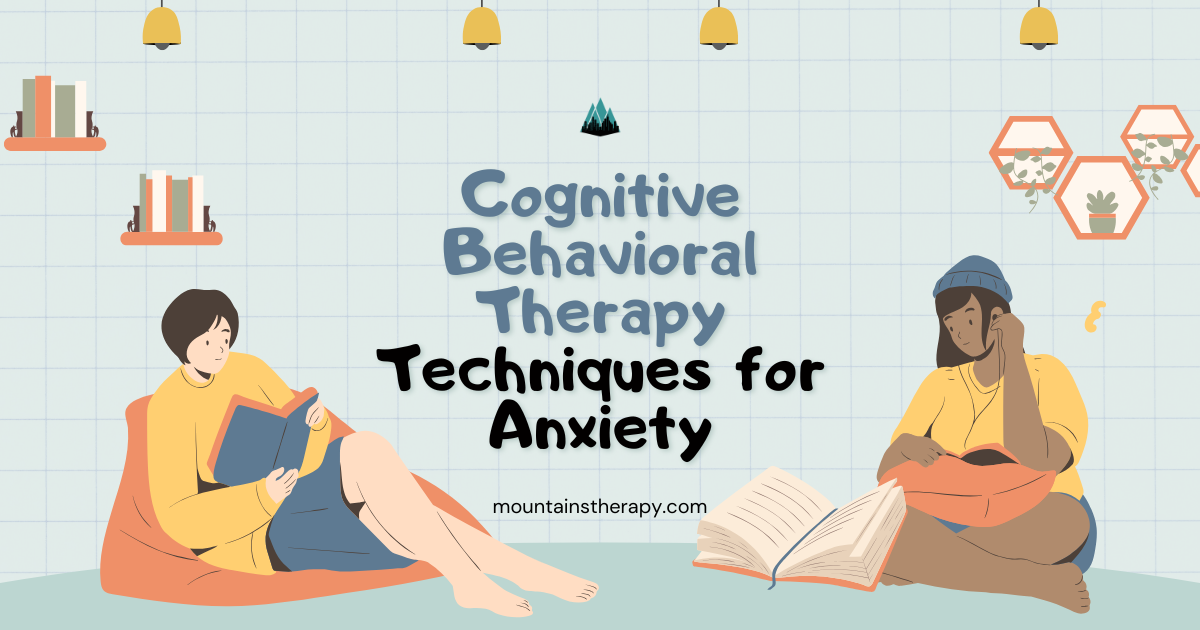Cognitive Behavioral Therapy Techniques for Anxiety: How to Break Free from Worry
Learn more about CBT Therapy and Anxiety Therapy.
In This Blog, You’ll Learn:
- How Cognitive Behavioral Therapy (CBT) helps anxiety
- What CBT techniques are most effective for treating anxiety
- How CBT is used for social anxiety, health anxiety, and general anxiety
- Why starting therapy can help you feel more in control
Feeling Stuck in Anxiety? You’re Not Alone.
If you’ve been struggling with anxiety—whether it’s racing thoughts, constant worry, or that overwhelming sense of dread—you’re not alone. Anxiety can make even the simplest tasks feel impossible. Maybe you’ve been Googling things like “can CBT cure anxiety?” or “how does CBT treat anxiety?” looking for answers. The good news? You’ve found one.
At Mountains Therapy in Montclair, NJ, we specialize in Cognitive Behavioral Therapy (CBT), an evidence-based approach that helps people just like you take back control of their thoughts and emotions. Whether you’re dealing with health anxiety, social anxiety, or general anxiety, CBT techniques can help you break free from the cycle of worry and fear. If you’re looking for the best therapist in Montclair, NJ, or wondering, “What is CBT therapy for anxiety?”, you’re in the right place.
What Is CBT for Anxiety and How Does It Work?
CBT is one of the most effective treatments for anxiety. It’s not just about talking, it’s about learning practical skills to manage anxious thoughts and behaviors.
CBT teaches you to:
- Recognize and challenge negative thought patterns
- Reframe anxious thinking into more balanced, rational thoughts
- Use exposure techniques to reduce fear and avoidance
- Develop healthier coping strategies for stressful situations
You might be wondering, “How does CBT explain anxiety?” Anxiety isn’t just something that happens to you—it’s often fueled by the way you think and respond to stressors. CBT helps you break the cycle by teaching you how to change your reactions and behaviors.
Can CBT Help With Different Types of Anxiety?
Absolutely. Many people ask, “Can CBT help health anxiety?” or “Can CBT help social anxiety?” The answer is yes! CBT is highly adaptable and effective for different types of anxiety, including:
- Generalized Anxiety Disorder (GAD) – Constant worry about everyday things
- Social Anxiety – Fear of judgment, avoiding social situations
- Health Anxiety – Obsessive concerns about illness, excessive health-related Googling
- Panic Disorder – Sudden, intense panic attacks and physical symptoms
If you’ve ever thought, “Can CBT make anxiety worse?”, it’s important to know that while therapy can be challenging at times, it’s designed to help you work through anxiety in a safe and supportive way. The goal isn’t to make you more anxious—it’s to help you feel empowered.
How Long Does CBT for Anxiety Take?
Many clients ask, “How long does CBT for anxiety take?” While every person is different, studies show that most people start to see improvement within 12-20 sessions. The more you practice the techniques outside of therapy, the faster you’ll notice a shift in your thinking and reactions. The beauty of CBT is that it equips you with lifelong tools. Even after therapy ends, you’ll continue using these skills to manage stress and anxiety in daily life.
What Are the Best CBT Techniques for Anxiety?
Some of the most effective Cognitive Behavioral Therapy techniques for anxiety include:
- Cognitive Restructuring – Identifying and challenging negative thought patterns
- Exposure Therapy – Gradually facing fears in a controlled way
- Behavioral Activation – Taking small, manageable steps to re-engage with life
- Mindfulness and Relaxation Techniques – Learning to stay present and reduce worry
If you’ve ever wondered, “Why CBT for anxiety?”, it’s because these techniques are backed by research and have helped millions of people regain control over their anxiety.
Cognitive Behavioral Therapy History
Cognitive Behavioral Therapy (CBT) has been around for decades, evolving from earlier psychological approaches. Who dIt was developed in the 1960s by Dr. Aaron Beck, a psychiatrist who noticed that his patients’ thoughts had a direct impact on their emotions and behaviors. Around the same time, psychologist Albert Ellis introduced Rational Emotive Behavior Therapy (REBT), a technique that also focused on changing negative thought patterns.
These groundbreaking approaches formed the foundation of modern CBT, which has since become one of the most researched and effective therapies for anxiety, depression, and many other mental health concerns. If you’ve ever asked, “How does CBT explain anxiety?”, it all started with the idea that our thoughts shape our emotions—and by changing those thoughts, we can change how we feel and react. Today, CBT is widely used by the best therapists and counselors near you to help clients take control of anxiety and live healthier, more balanced lives.
Taking the First Step Toward Anxiety Relief
Finding the right therapist or counselor can feel overwhelming, but you don’t have to do it alone. If you’ve been searching for “the best therapist near me” or “the best therapy near me”, we’re here to help. Mountains Therapy NJ has been voted best therapy for a reason—we genuinely care about helping you thrive. If you’re ready to stop feeling controlled by anxiety and start living the life you deserve, reach out today. Let’s take this step together.











